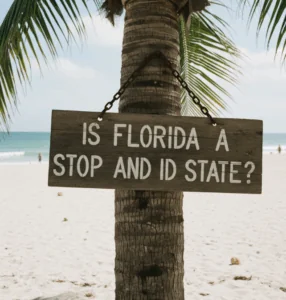Is Florida a Stop and ID State?
Yes, Florida is generally considered a “stop and ID” state based on the interaction between the following statutes:
- “Stop and Frisk Law” found at Fla. Stat. §901.151
- “Loitering and Prowling” statute found at Fla. Stat. §856.021(2)
Because of the interaction between these two statutes, a person might be required to identify themselves when requested by a law enforcement officer, but only if that officer reasonably suspects that a crime has been committed, is being committed, or is about to be committed.
Why does it matter? The evidence gathered illegally might be suppressed if the officer’s detention or request violates the Fourth Amendment’s prohibition on unreasonable searches and seizures. The distinction, however, does little to help a person deal with law enforcement officers during an unlawful detention.
In Terry v. Ohio, 392 U.S. 1 (1968), the U.S. Supreme Court found the U.S. Constitution allowed a police officer to temporarily detain a person based on “specific and articulable facts” establishing reasonable suspicion that a crime has been committed, is being committed, or is about to be committed. The U.S. Supreme Court extended that holding by finding that a statute requiring a suspect to disclose their name during a valid Terry stop did not violate the Fourth Amendment in Hiibel v. Sixth Judicial District Court of Nevada, 542 U.S. 177 (2004).
Some stop-and-identify statutes are unconstitutional under the void for vagueness doctrine when the statutory language is unclear on how a person must identify themselves when requested. Other problems include whether a person can refuse to identify themselves if doing so would be incriminating.
Generally, you are not necessarily required to show a photo identification card or driver’s license because stating your full name and date of birth is often deemed sufficient. But giving any advice on this topic is impossible due to all the variables involved in a typical detention.
Problems With Refusing to Identify Yourself or Show Your ID
The information listed here should not be relied on when interacting with law enforcement. Instead, this article is intended to help you spot issues that might exist in your case if you were illegally detained in the past. Most of these issues can only be determined by the court in a hearing on a motion to suppress long after the detention has ended.
As a practical matter, asserting the right to refuse to identify yourself is difficult for the following three reasons:
- First, it is difficult to tell whether the request for your name and identification is being made during a consensual encounter or as part of a detention.
- For this reason, people sometimes say: “I don’t answer questions. Am I free to go?”
- Second, the officer usually has no obligation to tell you the basis of their suspicion.
- Instead, if you are illegally detained, and evidence is gathered due to that illegal detention, your attorney should file a motion to suppress that evidence.
- At a hearing on the motion, the prosecutor would then have the burden of presenting evidence showing a legal basis for the stop, detention, and request for identification.
- Third, if you refuse to identify yourself, that refusal might support the probable cause to arrest you for “loitering and prowling.”
- Although a warrantless arrest for most misdemeanors requires that each element of the crime was committed in the officer’s presence, an exception was created for more than 20 misdemeanors, including any criminal act under § 856.021 for loitering and prowling. See Fla. Stat. § 856.031.
Read more about Florida’s “Stop and Frisk Law” in Fla. Stat. §901.151.
Florida’s “Loitering and Prowling” Statute – Fla. Stat. §856.021(2)
Florida’s “loitering and prowling” statute under Fla. Stat. §856.021(2) provides a list of circumstances that may be considered in determining whether such alarm or immediate concern is warranted, including whether the person:
- takes flight upon the appearance of a law enforcement officer;
- refuses to identify themself; or
- manifestly endeavors to conceal themself or any object in their possession.
The statute also provides that “a law enforcement officer shall, before any arrest for an offense under this section, afford the person an opportunity to dispel any alarm or immediate concern which would otherwise be warranted by requesting the person to identify himself or herself and explain his or her presence and conduct.”
Remember that once you show a photo identification card or driver’s license or state your full name and date of birth, you are not required to answer other questions.
This article was last updated on Thursday, September 11, 2025.
